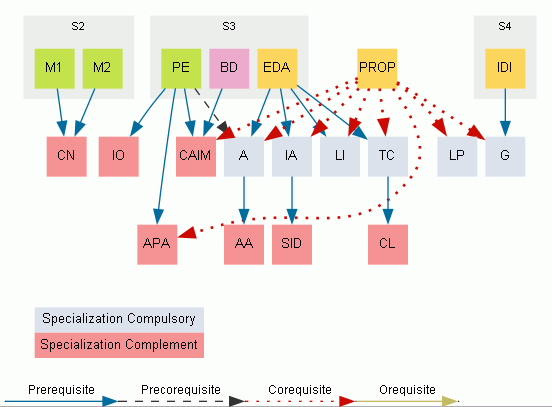Computing
Students who choose this specialisation will learn to design complex computer systems that comply with critical efficiency, reliability and security requirements. They will acquire the knowledge to assess these requirements and recommend the most suitable hardware, programming languages and algorithms for specific solutions.
Have a look at the briefing of this specialisation:
Career options
Graduates with specialised training in Computing possess the knowledge and skills to design complex computer systems that comply with critical efficiency, reliability and security requirements, applicable to areas such as flight scheduling, the verification of ABS braking systems or the development of person-machine interfaces for next-generation mobile telephones. Social responsibility places greater focus on energy efficiency and economic efficiency, and IT professionals capable of working within these parameters are highly valued in a wide range of fields, including robotics and industrial process optimisation, financial product development and forecasting, public infrastructure planning, scientific experimentation and image processing in biomedical research centres, and video game and web application programming.
The growing need for innovation has increased the demand for professionals with the training and scientific rigour to join multidisciplinary teams of engineers, scientists or economists. Computing specialists are highly valued for their ability to innovate and to identify and guarantee the critical requirements of complex computer systems, which makes them ideal candidates to lead international companies at the forefront of this change in the IT industry.
Specialization coordinator
| Person | Department | |
|---|---|---|
| Blesa Aguilera, Maria Josep | CS |
Specialization teachers
Technical Competences of each Specialization
COMPUTER SCIENCE SPECIALIZATION
- CCO1
To have an in-depth knowledge about the fundamental principles and computations models and be able to apply them to interpret, select, value, model and create new concepts, theories, uses and technological developments, related to informatics.- CCO1.1
To evaluate the computational complexity of a problem, know the algorithmic strategies which can solve it and recommend, develop and implement the solution which guarantees the best performance according to the established requirements. - CCO1.2
To demonstrate knowledge about the theoretical fundamentals of programming languages and the associated lexical, syntactical and semantic processing techniques and be able to apply them to create, design and process languages. - CCO1.3
To define, evaluate and select platforms to develop and produce hardware and software for developing computer applications and services of different complexities.
- CCO1.1
- CCO2
To develop effectively and efficiently the adequate algorithms and software to solve complex computation problems.- CCO2.1
To demonstrate knowledge about the fundamentals, paradigms and the own techniques of intelligent systems, and analyse, design and build computer systems, services and applications which use these techniques in any applicable field. - CCO2.2
Capacity to acquire, obtain, formalize and represent human knowledge in a computable way to solve problems through a computer system in any applicable field, in particular in the fields related to computation, perception and operation in intelligent environments. - CCO2.3
To develop and evaluate interactive systems and systems that show complex information, and its application to solve person-computer interaction problems. - CCO2.4
To demonstrate knowledge and develop techniques about computational learning; to design and implement applications and system that use them, including these ones dedicated to the automatic extraction of information and knowledge from large data volumes. - CCO2.5
To implement information retrieval software. - CCO2.6
To design and implement graphic, virtual reality, augmented reality and video-games applications.
- CCO2.1
- CCO3
To develop computer solutions that, taking into account the execution environment and the computer architecture where they are executed, achieve the best performance.- CCO3.1
To implement critical code following criteria like execution time, efficiency and security. - CCO3.2
To program taking into account the hardware architecture, using assembly language as well as high-level programming languages.
- CCO3.1
Subjects
Specialization compulsory subjects
- Algorithmics (A)
- Prerequisite: EDA - Data Structures and Algorithmics
- Precorequisite: PE - Probability and Statistics
- Corequisite: PROP - Programming Projects
- Graphics (G)
- Prerequisite: IDI - Interaction and Interface Design
- Corequisite: PROP - Programming Projects
- Artificial Intelligence (IA)
- Prerequisite: EDA - Data Structures and Algorithmics
- Corequisite: PROP - Programming Projects
- Logics in Information Technology (LI)
- Prerequisite: EDA - Data Structures and Algorithmics
- Corequisite: PROP - Programming Projects
- Programming Languages (LP)
- Corequisite: PROP - Programming Projects
- Theory of Computation (TC)
- Prerequisite: EDA - Data Structures and Algorithmics
- Corequisite: PROP - Programming Projects
Specialization complementary subjects
- Advanced Algorithmics (AA)
- Prerequisite: A - Algorithmics
- Machine Learning (APA)
- Prerequisite: PE - Probability and Statistics
- Corequisite: PROP - Programming Projects
- Massive Information Search and Analysis (CAIM)
- Prerequisite: BD - Databases
- Prerequisite: PE - Probability and Statistics
- Corequisite: PROP - Programming Projects
- Compilers (CL)
- Prerequisite: TC - Theory of Computation
- Numerical Computation (CN)
- Prerequisite: M1 - Mathematics I
- Prerequisite: M2 - Mathematics II
- Operations Research (IO)
- Prerequisite: PE - Probability and Statistics
- Distributed Intelligent Systems (SID)
- Prerequisite: IA - Artificial Intelligence

Requisites between subjects
© Facultat d'Informàtica de Barcelona - Universitat Politècnica de Catalunya - Website Disclaimer - Privacy Settings


